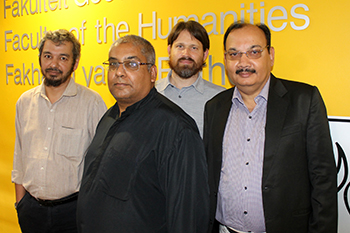Latest News Archive
Please select Category, Year, and then Month to display items
08 April 2021
|
Story Thabo Kessah
|
Photo UFS Photo Archive
 Dr KPD Maphalla with former UFS Chancellor, Dr Franklin Sonn, during the graduations in April 2007.
Dr KPD Maphalla with former UFS Chancellor, Dr Franklin Sonn, during the graduations in April 2007.
The University of the Free State is sad to learn of the passing of alumnus and award-winning Sesotho literary giant, Dr KPD Maphalla.
The literary works of Dr Khotso Pieter David Maphalla, like many other African writers and artists, were influenced and characterised by his own era of powerful forms of oppression and exclusion from dominant literary discourses. In his own right and through his writings of poetry, novels, short stories, and kodiamalla (dirge), he articulated a deliberate political and social protest and pushed for a place for African languages in literature at the height of apartheid.
“He entered the professional scene with his ground-breaking novel, Kabelwamanong, in 1982 at the age of 27. His career actually started in 1971 while he was still at school. Since his first novel, he has produced at least two books annually, covering the genres of poetry, novels, dramas, and short stories. As a dramatist, Dr Maphalla has written a number of excellent and educative radio dramas for the then Radio Sesotho (now Lesedi FM),” said his long-time friend and Head: African Languages at the University of the Free State, Dr Nyefolo Malete.
“It was for this writing prowess that he received recognition from the UFS when he was awarded an Honorary Doctorate in Literature by the Department of African Languages during a momentous ceremony on the Qwaqwa Campus in 2007,” added Dr Malete.
Dr Malete also revealed that, despite losing the use of his right hand after suffering a stroke following a car accident in the late 1990s, Dr Maphalla continued writing using his left hand. “He was adamant that, what he referred to as his ‘supposed disability’, would not deter his passion for writing.”
Dr Maphalla’s work has also produced numerous scholarly studies by the likes of Profs Moleleki Moleleki (protest poetry), Thapelo Selepe (lament and protest poetry), and Dr Seema Seema (process of cross-cultural communication). He was a committed Qwaqwa community member, who was also instrumental in the founding of Qwaqwa Community Radio (2000) and Metjodi Writers (2006), among others. He has written more than 70 books, many of which have been prescribed texts in schools.
Some of the awards he has won include:
South African Centre for Digital Language Resource (SADiLar) Sesotho Lexicographic Unit (Sesiu sa Sesotho) Lifetime Award for outstanding literary works and for promoting Sesotho literature (2019).
The Literature Festival and the University of the Free State Award for enormous contribution to Sesotho literature by a South African writer (2019).
Lifetime Achiever Award in Literature awarded by the Department of Arts and Culture (2005).
M-Net Book Prize for Sesotho poetry (2005). The first and thus far the only Sesotho author to have received this honour.
M-Net Book Prize for best novel (1996).
De Jager-HAUM Literary Award for his volume of short stories, Mohlomong Hosane (1993).
Thomas Mofolo Trophy for Best Novel, Best Poetry, and the Overall Award (1992).
Thomas Mofolo Trophy for Best Poetry (1991).
Dr JJ Moiloa Floating Trophy for Best Sesotho Poetry Book of the Year, Kgapa tsa ka (1985).
SA and Africa must avoid going over the edge
2017-02-26

From left are: Prof JM Moosa (Centre for African
Studies, Jawaharlal Nehru University, India),
Prof Hussein Solomon (Senior Professor: Political
Studies and Governance at the UFS),
Prof Virgil Hawkins (Osaka School of International
Public Policy Studies, Osaka University in Japan), and
Prof Ajay Dubey (Centre for African Studies, Jawaharlal Nehru
University, India).
Photo: Jóhann Thormählen
South Africa and the rest of Africa might be standing on the edge of a cliff and therefore conversations are necessary to avoid tipping over. According to Prof Hussein Solomon that was why a conference to address these issues was recently co-hosted by the University of the Free State (UFS).
Prof Solomon, Senior Professor of Political Studies and Governance at the UFS, said the continent and country needed to make the right decisions. “These right choices refer to the correct economic, political, and social policies.”
International delegates attend
Delegates from India, Japan, Zambia, Lesotho and South Africa attended the conference, called A View from the Precipice: Critical Reflections on South Africa and Africa in the 21st Century, on 13 and 14 February 2017 on the Bloemfontein Campus. It was co-hosted by the UFS Department of Political Studies and Governance, Jawaharlal Nehru University (India), Centre for the Engagement on African Peace and Security, Southern African Centre for Collaboration on Peace and Security and Osaka University (Japan).
Prof Solomon said external actors provided a useful mirror as they gave an idea of how Africa and South Africa were viewed from abroad.
Creating a knowledge-sharing forum
“It is not just about sharing knowledge, but creating a forum for sharing knowledge,” said Prof Virgil Hawkins from the Osaka School of International Public Policy Studies.
Prof Hawkins, who is a visiting professor at the UFS, said a conference like this was one of the cornerstones of the relationship between the UFS and Osaka University. Prof Solomon is also a visiting professor at last mentioned university.
Highlights of conference
Prof Solomon said some of the discussions included that “the ANC government is in crisis and is dragging the rest of the country with it”. Another participant said that 80% of the jobs in the next 20 years had not been created yet – which put the relevance of tertiary education in the spotlight.